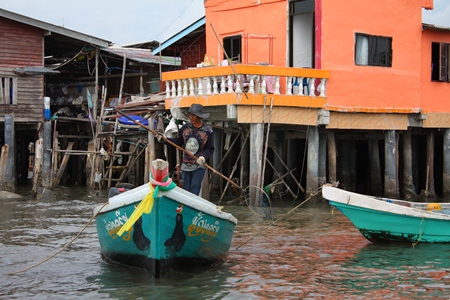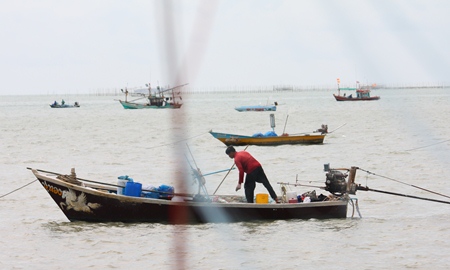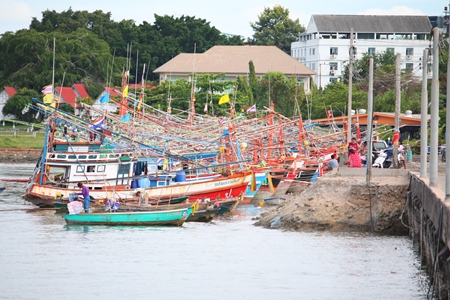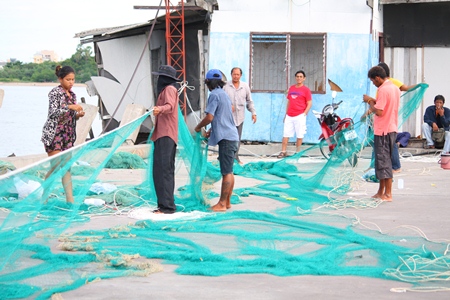Pattaya Bay’s woefully depleted marine ecosystem has gained an unlikely ally, as a group of Naklua fishermen are repairing the damage done by overfishing by using smaller boats and special nets.
The Naklua Small Fishing Boats group is comprised of about 25 local captains who are hoping to save the waters inside Pattaya’s Near Islands by moderating catches and building artificial reefs to replenish fish and coral.
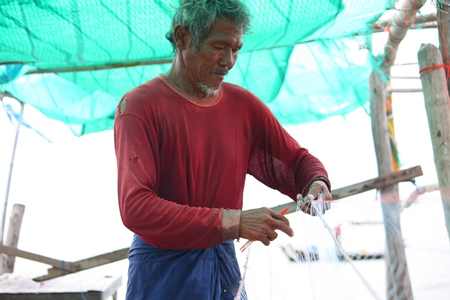 Local fishermen are experts in the ancient art of net repair.
Local fishermen are experts in the ancient art of net repair.
Sunya Phatsaena, a consultant to the group, said the fishermen have been sticking to waters a kilometer or less off shore for two years, using biodegradable nets with larger holes to catch only what they need. At the same time, they’ve been working with the Department of Marine and Coastal Resources to weave and deploy structures made of rope that can be transformed by hardened coral into artificial reefs.
Fisherman Sombun Jankua said the new nets are made of bone byproducts and last only a year, compared with as many as six years for synthetic nets. But when nets are lost, they don’t suffocate coral reefs or entangle fish for long periods of time, as do the artificial versions.
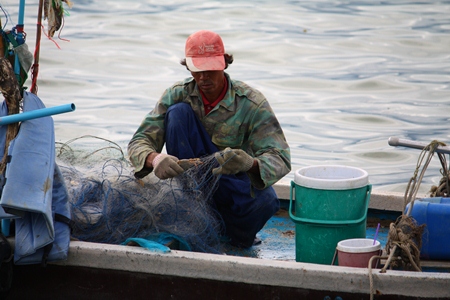 A fisherman removes crabs from his net after catching them in Naklua Bay.
A fisherman removes crabs from his net after catching them in Naklua Bay.
The problem, he said is that “most fishermen opt to use nets that offer the most convenience and return on investment.”
The idea behind the special nets and cages is to catch only larger fish, allowing juvenile creatures to escape, mature and breed.
Twenty fishermen against an entire Thai industry devoted to strip-mining coastal waters is a daunting challenge, however. Even as Naklua’s “green” anglers work to preserve the ecosystem – and their traditional livelihoods – large corporate-owned boats using dense nets continue to violate marine laws by trawling inside the 1 kilometer zone. Their nets catch everything, young or old, in their wake and rip across coral reefs with tragic consequences.
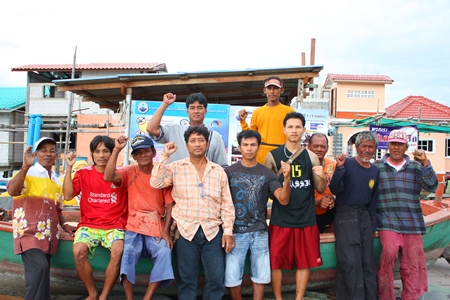 Members of the Naklua Small Fishing Boats group are determined to continue preserving the ecosystem in Naklua Bay.
Members of the Naklua Small Fishing Boats group are determined to continue preserving the ecosystem in Naklua Bay.
The fishermen also complain about pollution, particular that streaming from Laem Chabang Port and nearby industrial complexes. Fisherman Banthit Jai-aaree also noted eco-conscious anglers face challenges from boats filled with illegal aliens, politically connected fishing operators who can trawl in protected waters or use illegal nets without fear of the law, and non-Pattaya residents poaching crabs.
“The group is absolutely concerned. We have put up signs indicating the area as a protected zone, but there are still trespassers,” Banthit said. “The government has tried to preserve crabs species by breeding and releasing them into the sea. I believe that if citizens do not realize the importance of small crabs and continue to catch them there will be no crabs in Naklua waters in the future.”
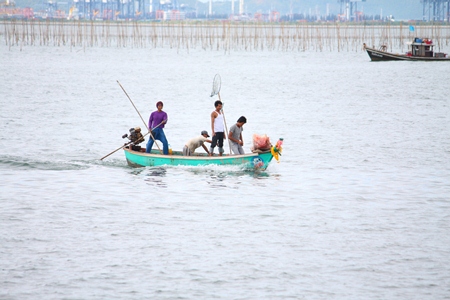 Fishermen return from the sea.
Fishermen return from the sea.
There are positive signs, however, such as the government’s decision to sink three retired navy ships off Koh Larn, Koh Sak and Koh Phai to become artificial reefs. The 9-year-old Khram wreck on the far islands and 6-year-old Kut wreck off Koh Sak, in particular, have grown into thriving marine habitats, although the more-remote Khram wreck is often victimized by illegal fishing.
Sunya said the effects of the shipwreck reefs have been felt in Naklua Bay, which has seen a return of snapper, grouper and crabs.
He said the fish, and small catches, don’t bring the fishermen large bounties at markets, but the fact that they can continue to fish for years into the future is reassuring.
In addition, he said, fishermen have found new income from eco-tourists and amateur anglers who want to go out on the water.
